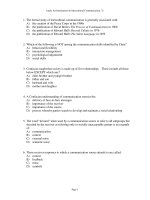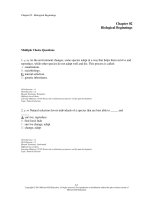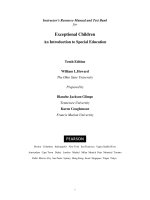An introduction to intercultural communication 7th edition jandt test bank
Bạn đang xem bản rút gọn của tài liệu. Xem và tải ngay bản đầy đủ của tài liệu tại đây (131.48 KB, 7 trang )
Jandt, An Introduction to Intercultural Communication, 7e
1. The formal study of intercultural communication is generally associated with:
A) the creation of the Peace Corps in the 1960s
B) the publication of David Berlo's The Process of Communication in 1960
C) the publication of Edward Hall's Beyond Culture in 1976
D) the publication of Edward Hall's The Silent Language in 1959
2. Which of the following is NOT among the communication skills identified by Chen?
A) behavioral flexibility
B) interaction management
C) psychological adjustment
D) social skills
3. Confucius taught that society is made up of five relationships. These include all those
below EXCEPT which one?
A) elder brother and younger brother
B) father and son
C) husband and wife
D) mother and daughter
4. A Confucian understanding of communication stresses the:
A) delivery of face-to-face messages
B) importance of the receiver
C) importance of the source
D) process whereby parties search to develop and maintain a social relationship
5. The word “deviant” when used by a communication source to refer to all subgroups but
decoded by the receiver as referring only to socially unacceptable groups is an example
of:
A) communication
B) context
C) external noise
D) semantic noise
6. Those receiver responses to which a communication source attends to are called:
A) context
B) feedback
C) noise
D) symbols
Page 1
Jandt, An Introduction to Intercultural Communication, 7e
7. As an example of how the definition of communication reflects cultural beliefs, the Berlo
model of communication does seem to stress the importance of the:
A) channel
B) message
C) receiver
D) source
8. In the mid-1990s, the estimated percentage of international web sites in English was:
A) 30%
B) 60%
C) 80%
D) 90%
9. In 2011, Google Translate provided text translations for:
A) 32 languages but not Chinese characters
B) 57 languages including Chinese characters
C) only English and Spanish
D) only English, Spanish, and Japanese
10. Schmid-Isler compared Western and Chinese Internet news sites and found a difference
in layout which is attributed to be related to:
A) culturally influenced perceptions of information storage and display
B) language symbol differences
C) the Internet browser used
D) values of what is considered to be socially polite
11. Speech that can cue prejudiced behavior in others is:
A) called hate speech
B) limited, by definition, to face-to-face interactions
C) prohibited in the United States
D) tolerated in Australia, Britain, Germany, and New Zealand
12. Internet online providers can be prosecuted by their content in:
A) Because the Internet is global, no country can control content.
B) Canada
C) Germany
D) United States
Page 2
Jandt, An Introduction to Intercultural Communication, 7e
13. Competent intercultural communicators interact effectively to achieve their own goals
regardless of the effect on those with whom they interact.
A) True
B) False
14. There are no global fundamental human values which can provide an ethical basis to
guide intercultural interactions.
A) True
B) False
15. Communication and culture should be studied separately.
A) True
B) False
16. That cultures define communication in diverse ways demonstrates that communication is
an element of culture.
A) True
B) False
17. The story of Mu Lan, a woman who disguised herself as a man and served 12 years as a
soldier so her ill father would not be disgraced teaches Confucian filial devotion.
A) True
B) False
18. Among the five effects June Yum describes that Confucianism has on interpersonal
communication is the use of intermediaries or third parties to avoid direct confrontation.
A) True
B) False
19. Korean has special vocabularies for each sex, for different degrees of social status and
degrees of intimacy, and for formal occasions.
A) True
B) False
20. Among the relationships which make up society from a Confucian perspective include
relationships with strangers.
A) True
B) False
Page 3
Jandt, An Introduction to Intercultural Communication, 7e
21. According to the text, because Confucianism does not consider relationships with
strangers, in Korea individuals may appear to be rude to those to whom they had not been
introduced.
A) True
B) False
22. The Chinese concept of guanxi is best translated as the “connections” one has.
A) True
B) False
23. In all communication models, the role of the communication receiver is passive.
A) True
B) False
24. Well into the 20th century, telephone company executives discouraged “socializing” by
telephone.
A) True
B) False
25. The ecological impact of cell phones is small.
A) True
B) False
26. In 2011, Cyworld, a Korea-based social network site enrolled about 10% of the entire
Korean population.
A) True
B) False
27. A study cited in the text by Jeff Greenberg and Tom Pyszczynski shows that hearing
ethnic slurs can cue prejudiced behavior against people when their behavior is less than
perfect.
A) True
B) False
Page 4
Jandt, An Introduction to Intercultural Communication, 7e
28. Like the United States, Australia, Britain, Canada, New Zealand, and Sweden have laws
prohibiting forms of hate speech.
A) True
B) False
29. The Internet has become a growing media for spreading prejudice and racism.
A) True
B) False
30. A study by Blanchard and colleagues demonstrated that hearing antiracist opinions can
reduce interracially insensitive public expressions.
A) True
B) False
31. The country with both the most landline users and cell phone users is ___________.
32. The country with the second largest number of cell phone users is _________.
33. If a telephone is answered with the phrase “Moshi moshi,” the person is most likely in
_________.
34. What is most commonly called text messaging in the United States, the United Kingdom,
and the Philippines is more likely to be known as __________ elsewhere.
35. In 2009, the country with the most Internet users is _________.
36. Discuss the four skill areas Chen identified for intercultural competence.
37. Explain how environmental sustainability could be another fundamental human value like
peace.
38. Describe the effects of Confucian thought on interpersonal communication.
Page 5
Jandt, An Introduction to Intercultural Communication, 7e
39. Define and give examples of the ten components of communication discussed in Chapter
2.
40. Other than words, what can be used as symbols to encode our thoughts?
41. Discuss the studies contrasting U.S., Korean, and Finnish students' use of social network
sites.
42. Discuss the First Amendment and hate speech in the United States.
Page 6
Jandt, An Introduction to Intercultural Communication, 7e
Answer Key
1.
2.
3.
4.
5.
6.
7.
8.
9.
10.
11.
12.
13.
14.
15.
16.
17.
18.
19.
20.
21.
22.
23.
24.
25.
26.
27.
28.
29.
30.
31.
32.
33.
34.
35.
36.
37.
38.
39.
40.
41.
42.
D
C
D
D
D
B
D
C
B
A
A
D
B
B
B
A
A
A
A
B
A
A
B
A
B
B
A
B
A
A
China
India
Japan
Short Message Service (SMS)
China
Page 7









